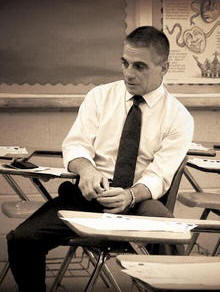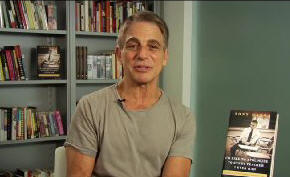The actor spent a lifetime in front of the camera — but
he always wanted to teach.
Tony Danza is
quoting Shakespeare to me, and it goes a little something like this:
There is a
tide in the affairs of men.
Which, taken
at the flood, leads on to fortune;
Omitted, all
the voyage of their life
Is bound in
shallows and in miseries.
On such a full
sea are we now afloat,
And we must
take the current when it serves,
Or lose our
ventures.
Of course, we all
know that those are the words of Brutus in Act 4, Scene 3 of
Julius Caesar. And, we know whereof Danza speaks. It’s all about
choices, and he’s made a lot of them. In his mere 61 years, he chose
many lives: actor, boxer, song-and-dance man, father, talk-show
host. And now — at
last, the vocation he’s always dreamed of: teaching.
 While
we’re at it, add one more vocation to his long list: writer. In
fact, he’s writing about being a teacher. His current book has the
attention-grabbing but honest title of I Want to Apologize to
Every Teacher I’ve Ever Had [Crown Publishing]. It’s a memoir
based on his experiences as a 10th grade English teacher in a
Northeast Philadelphia public school. The experiment was recently
captured in a short-lived A&E reality series called Teach: Tony
Danza.
While
we’re at it, add one more vocation to his long list: writer. In
fact, he’s writing about being a teacher. His current book has the
attention-grabbing but honest title of I Want to Apologize to
Every Teacher I’ve Ever Had [Crown Publishing]. It’s a memoir
based on his experiences as a 10th grade English teacher in a
Northeast Philadelphia public school. The experiment was recently
captured in a short-lived A&E reality series called Teach: Tony
Danza.
“Being a
first-year teacher is hard enough,” he tells me, “but imagine trying
to do it on camera.”
Unlike most
people, Danza does more than imagine; he acts. He does. And his
difficult teaching stint — recorded for millions to see — set
off a tidal wave of memories about his own Brooklyn education — or
lack thereof.
“I look back on
my high school years,” he says, “and I wonder — like
a lot of people — why I didn’t try harder? Why didn’t I engage more? Why
didn’t I learn more? What might my life have been like had I done
that?”
Not that he
scored so badly. While a neighborhood punk boxer, he was scouted and
plucked from obscurity to be a part of the legendary cast of the
classic series Taxi, starting in 1977. He was hired on his
charisma alone; he had not a drop of acting experience. From there,
he never looked back. Until now.
“I was lucky
because I was surrounded by these incredible people,” he says of his
castmates, “who were not only wonderful — so great to watch and work with — but they really went out of their way to make me feel
comfortable. I have a feeling it was making the best of a bad
situation. They were getting this fighter who never acted. Let’s
help him. And they did. They were so welcoming.”
That gig led to
another TV classic, Who’s the Boss, where he expanded his
acting and comedy chops, but his character was still named Tony.
“We tried to do
timeless subjects,” he explains. “You know — friendship, loyalty, trust — all
of those things that you know are going to stick around in society.
I think the clothes date the show very badly, but I don’t think the
themes do. I also think that the comedy stands up.”
Well-suited for a
stand-up guy who originally attended college to become a teacher,
but life somehow got in the way.
“I wanted to be a
teacher and I never did it,” he says. “It stayed with me. In
Who’s the Boss, the character Tony ends up being a teacher. It’s
always been a motif in my mind.”
 Of
course, times have changed a bit since Danza’s school days. Indeed,
times have changed, but people haven’t.
Of
course, times have changed a bit since Danza’s school days. Indeed,
times have changed, but people haven’t.
“Kids are still
kids, but they are besieged by a barrage of messages in our culture
that undermines an education,” he says. “You tell kids that good
behavior and hard work will pay off, then they go home and watch
whatever show they want to watch — you name it — and
they come back and tell me, ‘No, wait a minute, good behavior
doesn’t pay off and I don’t think those people are working hard.’”
Answers, Teach?
“We are all
talking a good game and it’s easy to blame the teachers,” he says,
“but in the long run, we all have to be a part of the solution.”
For Danza, the
path toward solution is to take it personally.
“I was always
trying to tie everything to students’ lives,” he says, “not just to
learn it for learning’s sake, but how does it affect them
personally? How come Shakespeare was so hip in 1500? How does he
know what we’re feeling right now?”
Which leads, of
course, to another quote, but this time from the playwright Arthur
Miller.
“The best thing
we can hope for is that we end up with the right regrets,” Danza
says. “I got a couple of mine, and I got a couple that ain’t so
right, but that’s another story.”
In the meantime, his book, with its apologetic title, is scoring big
points with the very people he once rejected, and who he now
embraces with a full heart.
He says, “Teachers are walking up to me on the street saying, ‘I
accept your apology.’”
Email
us Let us know what you
think.